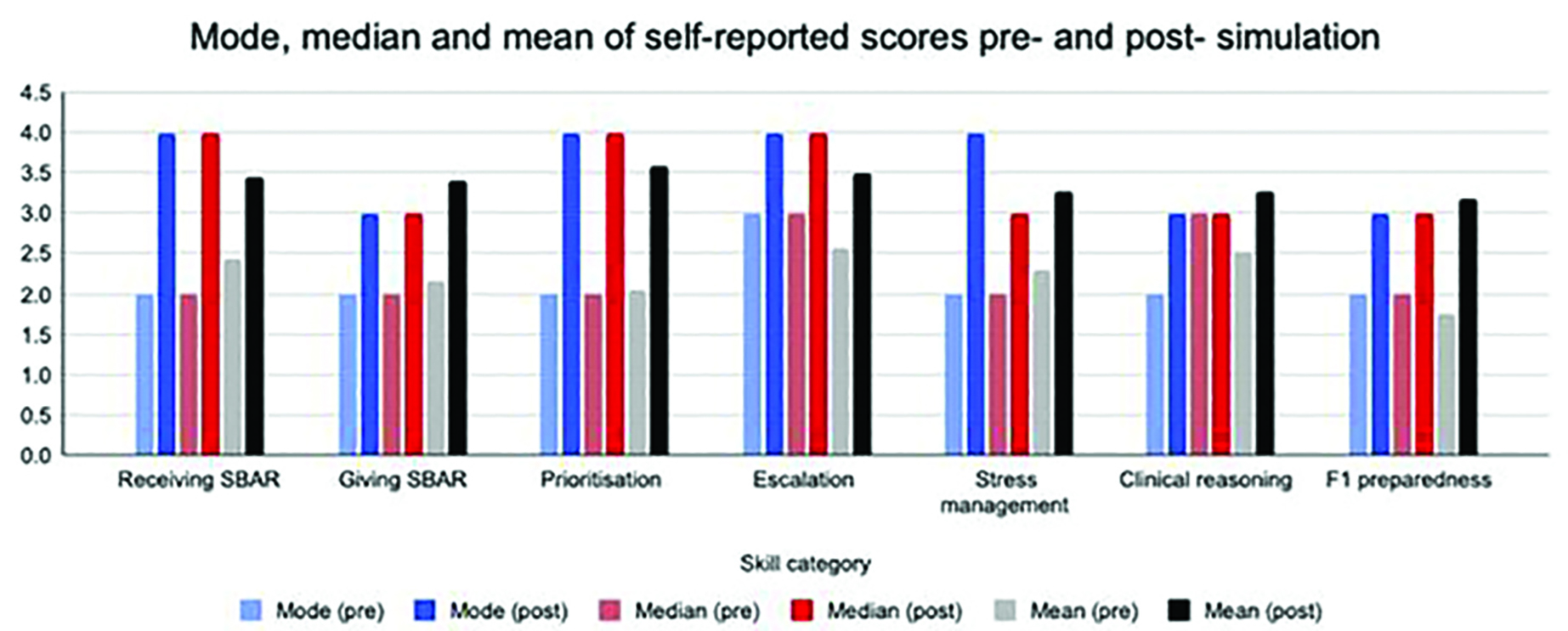
Many final-year student doctors report feeling underprepared and lacking in confidence in essential skills for on-call shifts [1]. On-call duties are a core component of foundation training. On-call simulation improves confidence in non-clinical skills such as prioritisation and stress management [2,3].
This project introduced a simulated on-call event for final-year student doctors at the University of Sheffield, aiming to boost confidence in non-clinical skills and preparedness for Foundation Year 1 (F1) on-call responsibilities.
To evaluate the impact of a simulated medicine on-call event on student doctors’ confidence in clinical and non-clinical skills.
23 final-year student doctors from the University of Sheffield participated in a three-part event: group teaching, simulation lab, and hospital-based simulation.
Students completed anonymised pre- and post-event self-assessment questionnaires rating their confidence across seven domains: receiving SBAR handover, providing SBAR handover, prioritisation, stress management, escalation, clinical reasoning, and overall preparedness for F1 medical on-calls. Responses used a 5-point Likert scale (1 = not confident at all; 5 = extremely confident). Scores were analysed using descriptive statistics and Mann-Whitney U analysis. The post-event questionnaire included additional feedback questions.
23 students completed the pre-event survey; 22 completed the post-event survey. 95.5% (21/22) reported increased confidence for medical on-calls; one reported no change.
The domain demonstrating greatest improvement was prioritisation: +2 in median and mode, and the highest mean increase: +1.55. Receiving SBAR handover and stress management increased by +2 in median and mode. Providing SBAR handover, escalation, and on-call preparedness increased by +1 in median and mode. Clinical reasoning remained unchanged in mode and median (score = 3) and had the lowest mean increase: +0.75. Mann-Whitney U analysis showed significant improvement in all domains individually (all p values <0.05), Figure 1. p values for mode (1.5), median (4), and mean (0) were all below the critical value at p<0.05 (8).
The simulation enhanced students’ confidence in core aspects of medical on-call duties. The most notable gains were in the domains of prioritisation, stress management, and providing SBAR handovers. There may be a need for additional interventions to further enhance clinical reasoning skills within this simulation. This study provides good evidence that simulation-based education is a highly effective method of increasing the confidence of student doctors in the skills required for on-call responsibilities.
Some limitations of this study include incomplete data sets, subjectivity of the Likert scale, and a small sample size. Further studies are required to validate findings.
As the submitting author, I can confirm that all relevant ethical standards of research and dissemination have been met. Additionally, I can confirm that the necessary ethical approval has been obtained, where applicable.
1. Tallentire VR, Smith SE, Wylde K, Cameron HS. Are medical graduates ready to face the challenges of Foundation training? Postgrad Med J. 2011 Sep;87(1031):590–5. doi: 10.1136/pgmj.2010.115659. Epub 2011 Jun 20. PMID: 21690255.
2. So HY, Chen PP, Wong GKC, Chan TTN. Simulation in Medical Education. Journal of the Royal College of Physicians of Edinburgh. 2019;49(1):52–57. doi: 10.4997/jrcpe.2019.112.
3. Alan M Greenstein, Muniswamy Hemavathi. The bleep experience: preparing new doctors for on-call shifts. Future Healthcare Journal. Volume 7, Issue 1. 2020. Pages 84–85. doi.org/10.7861/fhj.2019-0020. https://www.sciencedirect.com/science/article/pii/S2514664524007914
